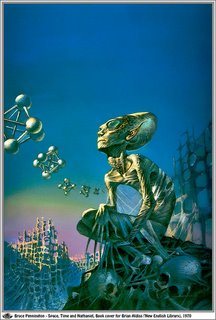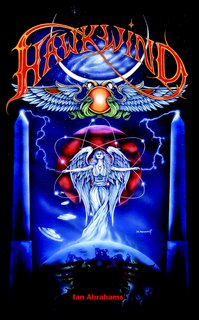Here's something I wrote back in October, in the hope of making a sale to a newspaper, on the SF author Kim Stanley Robinson.
Kim Stanley Robinson
In Kim Stanley Robinson’s latest novel, Fifty Degrees Below, one of his characters, discussing theoretical ways of reversing global warming, comments “We are going to become global biosphere managers.” Another responds “We already are. The problem is we don’t know how.”
Robinson is nothing if not the chronicler of the Big Picture.
Having already attended to the colonisation of Mars and explored the environmental implications of the world’s last great wilderness coming under pressure from oil exploration in Antarctica, KSR has recently turned his attention to the most pressing issue facing mankind today: catastrophic climate change.
With stunning poignancy Fifty Degrees Below, the second in Robinson’s ‘Science in the Capital’ sequence, opens where its predecessor (Forty Signs of Rain) left-off, in a Washington D.C. recovering from the effects of massive flooding where homes have been left uninhabitable and whole neighbourhoods rendered unusable. Its UK publication in the very week that one US Senator dared question the sanity of rebuilding New Orleans below sea level gives KSR’s message additional gravity and resonance.
“'I think my feeling is that perhaps nobody is competent to judge [the effects of global warming] and so we ought to err on the side of caution, presume that we are in trouble and act on that basis” Robinson has commented. Now he has shifted, previously positioned slightly towards the sceptic view on climate change he is now using his writings to examine every workable method of reversal from carbon sequestration to the monitoring of futures markets to establish the most scientifically feasible programmes that could be implemented.
Robinson’s stature as the leading light of what might be termed “Scientific Political Fiction” has grown immeasurably over recent years. He won SF’s most prestigious award, The Hugo, in 1994 for his novel Green Mars (the second part of his Martian opus) and again in 1997 for the trilogy’s finale Blue Mars. His peers amongst the SF writers fraternity accorded Red Mars, his original work, the Nebula Award in 1993. Those books were focused around the mechanics of transforming the Red Planet into a habitable environment and the ethical questions of so doing. Fifty Degrees Below turns the concept of “terraforming” on its head. Modern industrial society is about to change Earth beyond all recognition, what can be done to manage or reverse this?
“We could damage the environment to the point where it would be difficult to sustain 6 billion people” Robinson noted last year. “In which case there would be a scramble for food and other resources, meaning many wars etc.” Fifty Degrees Below, filled with intense scientific analysis of the current situation, discloses the chilling reality that could arise from a stalling of the Gulf Stream: Canada, on the same latitude as Europe, only grows enough food to feed its 30 million population. If Europe had a similar climate it would face a shortfall in food production of between four or five hundred million people.
The impact of the collision between our ecology needs and the demands made by the globalisation of capital has long been a preoccupation of Robinson and is a touchstone in much of his writings. Another is his passion for the outdoor life, for mountaineering and the exploits of his climbing heroes: Mallory and Irvine, Alison Hargreaves, Reinhold Messner.
His classic Martian stories, Arthur C. Clarke hailed Red Mars as “Staggering … the best novel on the colonisation of Mars that has ever been written”, came out of a novella, “Green Mars”. Infused with the moral dilemmas proliferate in his works, it was also an adventure tale about the first ascent of Olympus Mons (the highest mountain in the solar system) which Robinson saw as “a homage to the British climbers of the 70s, the Chris Bonnington group.”
Robinson was born in Waukegan, Illinois, in March 1952 and grew up in California. He achieved a B.A. in Literature at UC San Diego and then studied English at Boston University. Although he and his wife Lisa (an environmental chemist) lived for some time in Switzerland and then in Washington D.C he is now firmly ensconced back in California. Many of his readers may find his lack of a scientific background puzzling – his characters read like members of focus groups bouncing theory and counter theory back and forth and compiling long, detail lists of arguments and objectives. But as he noted in 2000 “I have been married to a scientist for 17 years and some of those years we hung out only with other scientists, so I’ve had the opportunity to study it in the real world.”
Initially his writings were of dystopian futures, novels located in his beloved California. The Wild Shore dealt with an American that had been quarantined following a devastating nuclear attack. The Gold Coast, a ‘cyberpunk’ vision of designer drugs and suburban terrorism and Pacific Edge, which concentrated his mind on ecological questions, dealing with the development of a last piece of wilderness followed. “I think there’s two big forces in the world” he would say. “Science and capitalism. I like scientists and I like to encourage them in their utopian aspects so that they aren’t always selling out to business.”
But success came once he’d pulled together his primary themes into the Mars series. Dividing his characters between the ‘Greens’ (for terraforming) and the ‘Reds’ (in favour of maintaining Mars in its untouched state) he was able to weave in his concerns on the impact of capital and the multinationals to create a grown-up vision of planetary exploration. “I try to pick future developments that look very much like they could happen given what we know now”, he commented. “Not very many hyperdrives etc.”
Another time, questioned on his own (variable by admission) views on transforming Mars he thought that the optimum engineering of the planet would include “being able to walk around in shirtsleeves at low elevations … higher elevations kept in their primal state by their great altitude.” It’s part of the contradiction in his works, a marvelling at what can be achieved, a moralistic “should we” backbone.
A two month stint in Antarctica, as a guest of the National Science Foundation’s Artists and Writers programme in 1995 left him with very different views on any interference there and led directly to his novel Antarctica in 1997. “The novel I wrote on my return is a kind of SF eco-thriller … having to do with the Antarctic Treaty, oil exploration, ecotage and new forms of living off the land” he commented. As with his Mars novels, Robinson also found room for another of his preoccupations – the stories of Scott, Amundsen and Shackleton – this time his characters debated the actions of Scott and his biographical assassination by Roland Huntford.
And so, via an untypical foray into alternative-history in the form of Years of Rice and Salt, Robinson has come back to the pressing questions of the day in his latest series. His view of the similarly themed blockbuster movie The Day After Tomorrow was as blunt as it was succinct. “Dumb, just dumb. They made the whole notion of global warming seem stupid. The audience I was with was insulted.”
In his treatment of his characters both as catalysts of scientific change and of conservative scepticism he has had to present logical cases for both sides of the climate change lobby divide and to understand and relate the complex clashes of interest within the federal government. When Senator Phil Chase, in Forty Signs of Rain, abandons a major programme intended to put some brake on impending climate breakdown in favour of passing just a small portion of legislation it’s explained as “like playing a chess game, each move is just a move in the larger game.”
For this set of books, Robinson has enjoyed first hand experiences of the world of which he writes. His time in Washington D.C, his participation in the National Science Foundation’s grant evaluation panels and the opportunity to research first hand the biotech work of a friend in San Diego. His books drip with the massive amount of experience gained from these encounters.
In seeing the story of the 21st Century as inevitably a struggle against the roller coaster ride of abrupt climate change, Robinson has noted that “mainstream American culture is in a state of deep denial … that is a huge problem.” With the effects of global warming and natural disasters promising the most expensive year for capital and society alike, it can only be hoped that our ostrich-culture can pull its collective head out of the sand and take notice.
Fifty Degrees Below is published by Harper Collins, £18.99 (ISBN 0-00-714889-5)



